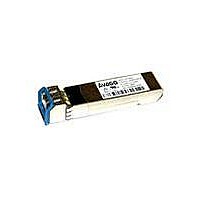AFCT-701SDZ Avago Technologies US Inc., AFCT-701SDZ Datasheet - Page 2

AFCT-701SDZ
Manufacturer Part Number
AFCT-701SDZ
Description
TXRX SFP+ SMF 10BGD 1310NM
Manufacturer
Avago Technologies US Inc.
Series
-r
Datasheet
1.AFCT-701SDZ.pdf
(18 pages)
Specifications of AFCT-701SDZ
Data Rate
10.312Gbd
Wavelength
1310nm
Applications
Ethernet
Voltage - Supply
3.135 V ~ 3.465 V
Connector Type
LC Duplex
Mounting Type
SFP
For Use With Fiber Type
Multimode
Function
SFP+ 10 Gb ethernet transceiver
Maximum Forward Current
289 mA
Maximum Power Dissipation
1000 mW
Transmission Distance
10 Km
Product
Transceiver
Diode Capacitance
14 pF
Maximum Rise Time
28 ps
Maximum Fall Time
28 ps
Maximum Output Current
20 mA
Operating Supply Voltage
3.465 V
Maximum Operating Temperature
+ 70 C
Minimum Operating Temperature
0 C
Supply Voltage
3.3V
Wavelength Typ
1310nm
Leaded Process Compatible
Yes
Peak Reflow Compatible (260 C)
Yes
Rohs Compliant
No
Lead Free Status / RoHS Status
Contains lead / RoHS non-compliant
For Use With
Multimode Glass
Lead Free Status / RoHS Status
Lead free / RoHS Compliant, Contains lead / RoHS non-compliant
Available stocks
Company
Part Number
Manufacturer
Quantity
Price
Company:
Part Number:
AFCT-701SDZ
Manufacturer:
Avago Technologies
Quantity:
135
Description,
Installation
The AFCT-701SDZ transceiver package is compliant with
the SFF 8432 Improved Pluggable Formfactor housing
specification for the SFP+. It can be installed in any INF-
8074 or SFF-8431/2 compliant Small Form Pluggable
(SFP) port regardless of host equipment operating status
The AFCT-701SDZ is hot-pluggable, allowing the mod-
ule to be installed while the host system is operating and
on-line. Upon insertion, the transceiver housing makes
initial contact with the host board SFP cage, mitigating
potential damage due to Electro-Static Discharge (ESD).
Digital Diagnostic Interface and Serial Identification
The two-wire interface protocol and signaling detail
are based on SFF-8431. Conventional EEPROM memo-
ry, bytes 0-255 at memory address 0xA0, is organized
in compliance with SFF-8431. New digital diagnostic
information, bytes 0-255 at memory address 0xA2, is
compliant to SFF-8472. The new diagnostic information
provides the opportunity for Predictive Failure Identifi-
cation, Compliance Prediction, Fault Isolation and Com-
ponent Monitoring.
Predictive Failure Identification
The AFCT-701SDZ predictive failure feature allows a host
to identify potential link problems before system perfor-
mance is impacted. Prior identification of link problems
enables a host to service an application via “fail over”
to a redundant link or replace a suspect device, main-
taining system uptime in the process. For applications
where ultra-high system uptime is required, a digital SFP
provides a means to monitor two real-time laser metrics
associated with observing laser degradation and pre-
dicting failure: average laser bias current (Tx_Bias) and
average laser optical power (Tx_Power).
2
continued
Compliance Prediction
Compliance prediction is the ability to determine if an
optical transceiver is operating within its operating and
environmental requirements. AFCT-701SDZ devices
provide real-time access to transceiver internal supply
voltage and temperature, allowing a host to identify po-
tential component compliance issues. Received optical
power is also available to assess compliance of a cable
plant and remote transmitter. When operating out of re-
quirements, the link cannot guarantee error free trans-
mission.
Fault Isolation
The fault isolation feature allows a host to quickly pin-
point the location of a link failure, minimizing downtime.
For optical links, the ability to identify a fault at a local
device, remote device or cable plant is crucial to speed-
ing service of an installation. AFCT-701SDZ real-time
monitors of Tx_Bias, Tx_Power, Vcc, Temperature and
Rx_Power can be used to assess local transceiver current
operating conditions. In addition, status flags TX_DIS-
ABLE and Rx Loss of Signal (LOS) are mirrored in memory
and available via the two-wire serial interface.
Component Monitoring
Component evaluation is a more casual use of the AFCT-
701SDZ real-time monitors of Tx_Bias, Tx_Power, Vcc,
Temperature and Rx_Power. Potential uses are as debug-
ging aids for system installation and design, and trans-
ceiver parametric evaluation for factory or field quali-
fication. For example, temperature per module can be
observed in high density applications to facilitate ther-
mal evaluation of blades, PCI cards and systems.


















